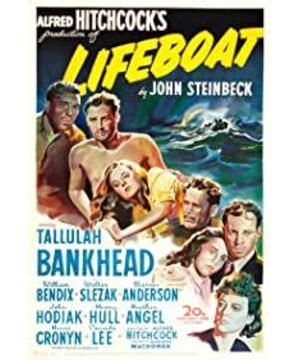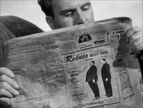However, the word "suspense" is not enough to sum up the name Hitchcock. Although Hitchcock was really interested in stunning his audience, there were times when his purpose, or his fact, turned out not only to create panic, but to tell us plainly and simply Deeply hidden, but a well-known secret. Lifeboat is one such movie.
In my opinion, there is nothing to be afraid of here. Very focused scene and plot: A passenger ship is hit by a German submarine, and the survivors are driven by fate to a small lifeboat. Different occupations, identities, classes, nationalities, and races are forced into a public space by irresistible objective external forces. At this time, some people who would never meet in peacetime, and who would never compete, had to help each other. Here comes the story. Thought, language, position, character, the combination of these elements will inevitably produce some interesting but unpredictable chemical reactions. This is a story with deep morals and cultural reflection. The concise and ingenious structure reflects the state of mind with great tension, and exposes the various faces and emotional essences in the subconscious of human nature.
suspense. Still have to say suspense. "The audience feels a unique tension when they know what a film character doesn't know, and have an emotionally strong desire to discover in time the fate that hangs over him." - a German film A professional interpretation of Hitchcock's film method by historians. "Unique tension," which is the effect of suspense. But "the audience knows", which is the basis of the suspense. This explanation is really pleasing. You see, the audience is acting as an overlooker outside of the movie, becoming an all-knowing, all-powerful God. Although this God can only watch the sin and be at a loss. This God, he was only entrusted with the functions of sighing and screaming. However, they know! That's it, suspense is born of a sufficiently intelligent and judgmental audience. The suspense is generated at the same time as the audience's satisfaction with self-intellect. However, the movie is short-lived. Usually, after countless upsets, Hitchcock is almost always kind enough to let his protagonist turn the corner. After dozens of minutes, the suspense was lifted with the false alarm of the protagonist. Dear God, have completed their intense task and returned to earth. At this time, the audience made a role adjustment while walking out from the lighted cinema. Real life lifeboats are parked just outside the door, and that's not as clear as sitting in the audience. In exchange for the real world, in fact, the tension is still the same, but it is not unique, adding a kind of absurdity. However, it has made a counterpoint replacement with the characters in the movie, from an audience who cares about others to a suspenseful protagonist in the real story.
I agree that Hitchcock's highest contribution was in enriching the word "suspense". No longer a frivolous trick, he expands our semantic understanding of "suspense." But I think that the value of Hitchcock's "suspense" research is not only reflected in the field of crime (although Hitchcock's all eyes are on criminology without exception), but a metaphor for It reveals the hidden and omnipresent suddenness of our daily life and basic interactions. The physical explanation for suspense is actually a gap. In the cinema, there is a gap between the ignorance of the protagonist and the insight of the audience. In real life, it is the movement of time that brings unpredictable and illogical changes to things. No one can predict what will happen in the next second. For example, the next second, you look out of the window, yes, it is any two people on the street. You see, one of them is walking towards the other, getting closer, getting closer... how close? So close that two people can be included in the same shot. At this time - "suspense" arises.
This is not a cinematic approach, this is Hitchcock's worldview. Hitchcock, that is, a reality accompanied by unease and danger.
View more about Lifeboat reviews











